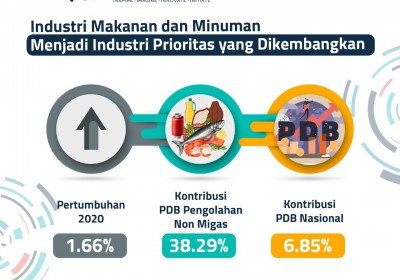Food & Beverage Industry Plays Leading Role during Pandemic
February 23, 2021
JAKARTA – The food and beverage (F&B) industry played a strategic role in providing the public’s consumption needs during the COVID-19 pandemic. It has also helped push the growth of the manufacturing sector, and therefore economic growth, during this period.
In 2020, the F&B industry emerged as one of Indonesia’s leading sectors, recording a growth of 1.66%. Its contribution towards the gross domestic product (GDP) as a non-energy industry reached 38.29% and it contributed 6.85% to the national GDP. Due to this, Industry Minister Agus Gumiwang Kartasasmita said that the Indonesian F&B industry has become a priority to develop further.
In order to ensure the industry’s contribution to the economy, there must be assurances regarding the supply of raw materials. Doing so will help maintain the industry’s productivity and competitiveness.
“We are currently amending a draft government regulation (RPP) under Regulation no. 11 on Industries Job Creation, to accommodate the assurance of raw material supply for industries,” Minister Agus said in Jakarta on Monday (8/2) in his prepared statement.
According to Minister Agus, discussions regarding the supply of raw production materials from both domestic and international sources will be based on the state of the country’s commodity balance sheet. Discussions will later involve all related ministries and institutions from upstream to downstream and will be coordinated by the Coordinating Economic Ministry.
The Indonesian Food and Beverage Businesses Association chairman Adhi S. Lukman is optimistic that the F&B industry will continue growing positively in 2021, with a projected growth of 5% to 7%
“We have not made quarterly projections yet, but we are optimistic that the industry will grow by 5 to 7%. So far, production factories are still running at normal rates and none of our association members have lodged any significant complaints,” he said as quoted by Bisnis.com on Sunday (7/2).
Adhi feels that the industry’s current growth is supported by crucial regulations ensuring the steady flow of raw material supplies. For example, the sugar industry has already obtained import permits with a volume of 1.9 million tons during the first semester of 2021. Overall, the F&B industry has acquired import permits allowing up to 3.3 million tons for a year. That figure is enough to meet the industry’s needs and also considers the possible growth that can happen this year.
Meanwhile for the salt industry, Adhi noted that he has yet to receive any complaints and concerns regarding having adequate supply for the Idul Fitri period because the Industry Ministry (Kemenperin) has already approved imports with a condition that 1.5 million tons must be produced this season.
In 2021, Adhi explained that retailers are also more optimistic in greeting the busy Ramadhan season. He feels that the general consuming public have learned to adapt to the COVID-19 pandemic by now.
Meanwhile, according to the Kemenperin’s director general for the agricultural industry Abdul Rochim, the pandemic, which has been going on for one year, has shifted the public’s consumption habits. While previously, consumers were more used to visiting supermarkets to shop, many have now gotten used to purchasing their needs online.
“The people who were used to eating out at restaurants now prefer to take home their meals or order them online,” he said in Jakarta on Tuesday (19/1).
These shifts in consumption behavior have prompted the food and beverage industry to be more active in coming up with innovations that can help ease the public’s consumption habits and fulfill sanitary, food preparation and health protocols as well. The shifting habits also strongly have to do with the transforming systems related to selling, logistics and production.
“Sellers who usually trade using conventional means are now learning how to sell online. The logistics sector also needs to adapt to new methods such as contactless systems that reduce the need for face-to-face interaction so that consumers will feel safer,” Rochim said.
New production systems that need to be implemented further in the industry include possible ways on how to process and package frozen foods and quick-serve products that can be made easier at home and can last longer.
Indonesia’s Research Institutions Supporting the Development of the Electric Vehicle Industry
Indonesian Muslim Fashion and Cosmetics IKMs Shine at Dubai World Expo 2020
Govt Steps Up UMKM Transformation Efforts in the Midst of Pandemic Slowdown
Govt Encourages Promotion of IKM Products in Digital Era
Government Begins Developing Maritime Training Center in Makassar
Tweets by IDDevForum
